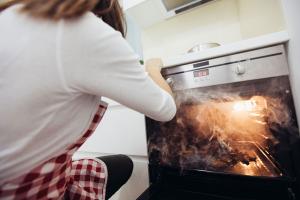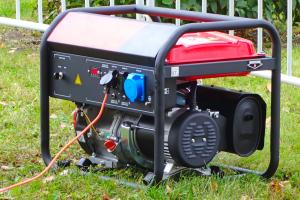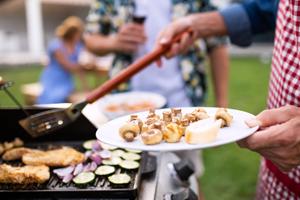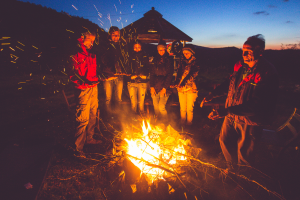Ways to help prevent kitchen fires

Cooking fires caused more than 3,300 injuries and $444 million in property loss in the U.S. from 2017 to 2019. Cooking was by far the leading culprit (51%) when it came to all residential fires - resulting in about 187,500 fire department calls during that same span.
Taking proactive safety measures can help reduce the risk of a fire in your home, making your kitchen even safer.
Kitchen precautions
- Make sure your smoke detectors are working.
- Maintain a clean environment (i.e. stovetop, vents, oven interior and countertops) to prevent a fire from starting.
- Do not store items in the oven in order to avoid forgetting and starting a fire when preheating.
- Keep a fire extinguisher on hand and get it inspected by the fire department regularly.
- Have a fire escape plan - and practice it twice a year.
Cooking tips
- Do not leave your stovetop unattended. This is the leading cause of kitchen fires. If you have to leave the room, turn your burner off.
- Avoid cooking while wearing loose clothes or dangling sleeves.
- Keep flammable items away from the stovetop and oven, such as hand towels, pot holders, napkins and wooden spoons.
- Keep a pan lid nearby when cooking on the stovetop with even a small amount of grease in case the pan catches on fire and you need to cover it, then turn off the burner and keep it covered until completely cooled.
- Use a timer to remind yourself that the oven is still on.
- Turn off the heat and keep the doors closed for oven fires.
- Never throw hot grease into the trash because combustible items can ignite a fire.
Child safety
- Teach children what smoke alarms sound like and when to call 911.
- Turn pot handles to the back of the stove, so they can’t be bumped or pulled down.
- Designate a few feet around the stovetop that children are not allowed to enter.
- Store children’s snacks away from the stovetop and oven.
If you are ever in doubt extinguishing a small fire, just get out of the house and close the door behind you to help contain the fire. Once safely outside, call 911.
Talk to your independent insurance agent about our home coverage options in order to protect you in the unfortunate event of a fire. Make sure you understand the difference between your home’s market value and its replacement cost to ensure you have the proper coverage and limits in place.
Sources:
National Fire Protection Association
The American National Red Cross
Related resources
Ways to help prevent kitchen fires
Cooking fires caused more than 3,300 injuries and $444 million in property loss in the U.S. from 2017 to 2019. Cooking was by far the leading culprit (51%) when it came to all residential fires - resulting in about 187,500 fire department calls during that same span.
Taking proactive safety measures can help reduce the risk of a fire in your home, making your kitchen even safer.
Kitchen precautions
- Make sure your smoke detectors are working.
- Maintain a clean environment (i.e. stovetop, vents, oven interior and countertops) to prevent a fire from starting.
- Do not store items in the oven in order to avoid forgetting and starting a fire when preheating.
- Keep a fire extinguisher on hand and get it inspected by the fire department regularly.
- Have a fire escape plan - and practice it twice a year.
Cooking tips
- Do not leave your stovetop unattended. This is the leading cause of kitchen fires. If you have to leave the room, turn your burner off.
- Avoid cooking while wearing loose clothes or dangling sleeves.
- Keep flammable items away from the stovetop and oven, such as hand towels, pot holders, napkins and wooden spoons.
- Keep a pan lid nearby when cooking on the stovetop with even a small amount of grease in case the pan catches on fire and you need to cover it, then turn off the burner and keep it covered until completely cooled.
- Use a timer to remind yourself that the oven is still on.
- Turn off the heat and keep the doors closed for oven fires.
- Never throw hot grease into the trash because combustible items can ignite a fire.
Child safety
- Teach children what smoke alarms sound like and when to call 911.
- Turn pot handles to the back of the stove, so they can’t be bumped or pulled down.
- Designate a few feet around the stovetop that children are not allowed to enter.
- Store children’s snacks away from the stovetop and oven.
If you are ever in doubt extinguishing a small fire, just get out of the house and close the door behind you to help contain the fire. Once safely outside, call 911.
Talk to your independent insurance agent about our home coverage options in order to protect you in the unfortunate event of a fire. Make sure you understand the difference between your home’s market value and its replacement cost to ensure you have the proper coverage and limits in place.
Sources:
National Fire Protection Association
The American National Red Cross
Related resources
Ways to help prevent kitchen fires
Cooking fires caused more than 3,300 injuries and $444 million in property loss in the U.S. from 2017 to 2019. Cooking was by far the leading culprit (51%) when it came to all residential fires - resulting in about 187,500 fire department calls during that same span.
Taking proactive safety measures can help reduce the risk of a fire in your home, making your kitchen even safer.
Kitchen precautions
- Make sure your smoke detectors are working.
- Maintain a clean environment (i.e. stovetop, vents, oven interior and countertops) to prevent a fire from starting.
- Do not store items in the oven in order to avoid forgetting and starting a fire when preheating.
- Keep a fire extinguisher on hand and get it inspected by the fire department regularly.
- Have a fire escape plan - and practice it twice a year.
Cooking tips
- Do not leave your stovetop unattended. This is the leading cause of kitchen fires. If you have to leave the room, turn your burner off.
- Avoid cooking while wearing loose clothes or dangling sleeves.
- Keep flammable items away from the stovetop and oven, such as hand towels, pot holders, napkins and wooden spoons.
- Keep a pan lid nearby when cooking on the stovetop with even a small amount of grease in case the pan catches on fire and you need to cover it, then turn off the burner and keep it covered until completely cooled.
- Use a timer to remind yourself that the oven is still on.
- Turn off the heat and keep the doors closed for oven fires.
- Never throw hot grease into the trash because combustible items can ignite a fire.
Child safety
- Teach children what smoke alarms sound like and when to call 911.
- Turn pot handles to the back of the stove, so they can’t be bumped or pulled down.
- Designate a few feet around the stovetop that children are not allowed to enter.
- Store children’s snacks away from the stovetop and oven.
If you are ever in doubt extinguishing a small fire, just get out of the house and close the door behind you to help contain the fire. Once safely outside, call 911.
Talk to your independent insurance agent about our home coverage options in order to protect you in the unfortunate event of a fire. Make sure you understand the difference between your home’s market value and its replacement cost to ensure you have the proper coverage and limits in place.
Sources:
National Fire Protection Association
The American National Red Cross
Related resources
Ways to help prevent kitchen fires
Cooking fires caused more than 3,300 injuries and $444 million in property loss in the U.S. from 2017 to 2019. Cooking was by far the leading culprit (51%) when it came to all residential fires - resulting in about 187,500 fire department calls during that same span.
Taking proactive safety measures can help reduce the risk of a fire in your home, making your kitchen even safer.
Kitchen precautions
- Make sure your smoke detectors are working.
- Maintain a clean environment (i.e. stovetop, vents, oven interior and countertops) to prevent a fire from starting.
- Do not store items in the oven in order to avoid forgetting and starting a fire when preheating.
- Keep a fire extinguisher on hand and get it inspected by the fire department regularly.
- Have a fire escape plan - and practice it twice a year.
Cooking tips
- Do not leave your stovetop unattended. This is the leading cause of kitchen fires. If you have to leave the room, turn your burner off.
- Avoid cooking while wearing loose clothes or dangling sleeves.
- Keep flammable items away from the stovetop and oven, such as hand towels, pot holders, napkins and wooden spoons.
- Keep a pan lid nearby when cooking on the stovetop with even a small amount of grease in case the pan catches on fire and you need to cover it, then turn off the burner and keep it covered until completely cooled.
- Use a timer to remind yourself that the oven is still on.
- Turn off the heat and keep the doors closed for oven fires.
- Never throw hot grease into the trash because combustible items can ignite a fire.
Child safety
- Teach children what smoke alarms sound like and when to call 911.
- Turn pot handles to the back of the stove, so they can’t be bumped or pulled down.
- Designate a few feet around the stovetop that children are not allowed to enter.
- Store children’s snacks away from the stovetop and oven.
If you are ever in doubt extinguishing a small fire, just get out of the house and close the door behind you to help contain the fire. Once safely outside, call 911.
Talk to your independent insurance agent about our home coverage options in order to protect you in the unfortunate event of a fire. Make sure you understand the difference between your home’s market value and its replacement cost to ensure you have the proper coverage and limits in place.
Sources:
National Fire Protection Association
The American National Red Cross





